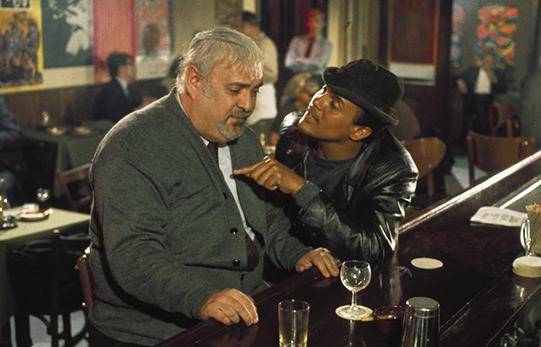Harry Belafonte and The Angel Levine

The Angel Levine (1970)
Something I’ve seen little mention of in the tributes to Harry Belafonte (1927–2023) is the dark 1970 urban drama The Angel Levine, which Belafonte produced and starred in. Based on a short story by Bernard Malamud (whose movie credits include The Natural), adapted for the screen by Bill Gunn (Ganja & Hess) and directed by Slovakian filmmaker Ján Kadár (The Shop on Main Street), it’s something of a working class New York knockoff of It’s a Wonderful Life, with Jimmy Stewart replaced by Zero Mostel as the old impoverished Jewish tailor Mishkin (whose wife is dying of a heart ailment), and Belafonte as his unlikely guardian angel Alexander Levine.
Its overlapping cuts (as in the opening montage where Mishkin witnesses Levine stealing a fur coat and subsequently being struck, apparently fatally, by traffic while fleeing), its perplexing shifts between color and black-and-white (and between flashback and story time), and its equivocal ending and narrative ambiguities (how much of the action really happens rather than being imagined) places it within a lineage of lightly surrealist American feature films of which Tár is a more recent example. Indeed it seems remarkable in retrospect that this gloomy, sluggish, sentimental and somewhat abstruse Belafonte vehicle (which marked his first film appearance since 1959’s Odds Against Tomorrow, and which led to a pair of popular 70s blaxploitation pairings with Sidney Poitier), could be released by United Artists and widely distributed in American movie theaters. I remember being confounded by it, along with most of the (predominately adult) audience, when my parents took me to see it during the heyday of family moviegoing in the US.
Of the two principals, it’s Belafonte who seems more comfortable portraying his character: a hustler in life turned angel-on-probation in death, tasked with rekindling Mishkin’s faith within 24 hours in order to earn his wings. It’s his lot to be as harshly judged in the afterlife as on Earth (“Every white mother up there was going through them gates—but me, they put me on probation, same kind of shit I’ve been having down here all my life”). Mostel, by contrast, often seems to struggle with his non-comic role, and one wonders how someone like Rod Steiger might have fared instead. Among the other cast members, Ida Kaminska is notable as Mrs. Mishkin and Gloria Foster (of The Matrix) as Levine’s jaded girlfriend-on-earth Sally.
The music was contributed by the Czeck composer Zdeněk Liška, who’s best represented by his electronic tracks for several Švankmajer animated shorts, as well as the Brothers Quay’s The Cabinet of Jan Švankmajer. This score is straightforward 70s film music, harpsichord-heavy and sometimes Klezmer-tinged (as in the intro’s slow waltz), with nary a hint of the calypso that Belafonte had popularized in the 1950s—though there is a bar scene with 70s funk blaring from the jukebox, and in the closing montage set in Harlem the harpsichord is replaced with a more gospel-shaded Hammond organ. A notable cameo in this sequence is made by Harlem’s old Commandment Keepers Ethiopian Hebrew Congregation, where a distraught Mishkin searches for Levine, who has vanished following his allotted 24 hours. In the dialog-less conclusion, Mishkin sees a black feather fluttering down from the sky. Is it from a crow, or did Levine really get his wings? Mishkin grasps for the feather, but is unable to reach it.
A product of the “crisis of faith” zeitgeist that also brought forth works like Leonard Bernstein’s Mass, The Angel Levine follows the distinctly Jewish custom of offering no easy answers to its parables on the nature of faith, friendship and love, here refracted through a contemporary prism of race relations. Like life, this obscure film confronts us with the need to cope with loss and ambiguity.